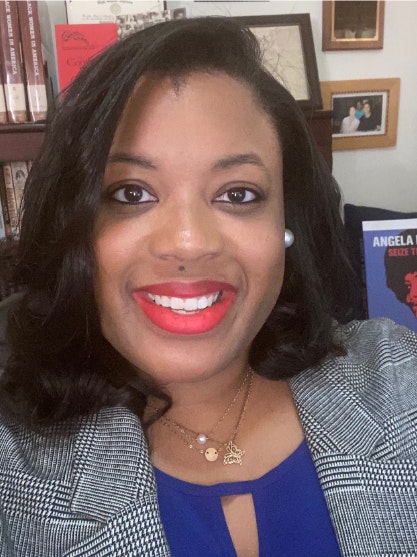Alexandria Russell: Recovering Untold Histories

Alexandria Russell is a historian and memorializer of African American women. She is bringing that expertise to her new role as a research fellow for the Presidential Initiative on Harvard and the Legacy of Slavery.
Russell—who is working a book titled Sites Seen and Unseen: Mapping African American Women’s Public Memorialization (University of Illinois Press, forthcoming)—works at the intersection of US history, African American history, and women and gender studies, and she is not new to the subject of slavery in university settings. After earning her doctoral degree in history from the University of South Carolina, she was a Scarlet & Black Project Postdoctoral Fellow at Rutgers, the State University of New Jersey, chronicling the school’s multicultural history. We asked her about her scholarly expertise and the work she will undertake for the initiative.
Harvard & the Legacy of Slavery: Your work is in public history and the digital humanities. How are these two disciplines related in your work—and why are they important to you?
Alexandria Russell: Public history and the digital humanities are connected through two central tenets: community engagement and accessibility. As a historian of African American women in the United States, it has always been important for me to engage with local communities across the nation and make my work available to all. I really enjoy curating authentic content that multiple constituencies can connect to literally and figuratively. I absolutely love that public history and the digital humanities are mediums that we can use our imagination and knowledge in to create custom experiences for people all over the world.
You’re working on a book that examines how Black women have been memorialized in the United States since the late 19th century. Do you see your work with Harvard & the Legacy of Slavery as an extension of that work?
Absolutely. My forthcoming book, Sites Seen and Unseen: Mapping African American Women’s Public Memorialization, is the first full-length scholarly study to chronicle the vast commemorations of Black women in every region of the United States. It has been a fascinating journey to recover historical narratives of African American public history, and I have enjoyed traveling to numerous historic sites and archival repositories for my research. My research has required that I ask different questions that push past the boundaries of the existing literature. Similarly, Harvard & the Legacy of Slavery is a historic project centered around recovery and telling histories that previously have been marginalized or completely overlooked. As communities continue to grapple with restructuring public history landscapes, I’m glad that my research and the work of Harvard & the Legacy of Slavery are both using the past to contextualize our contemporary moment.
You’ve said that H&LS uses the past to contextualize the present. Can you say more about this?
Harvard & the Legacy of Slavery is a dynamic project that examines the complex history of African American enslavement, resistance, civil rights, and their connection to the modern day. I love that it is a multifaceted history that demonstrates how the presence of slavery has impacted the foundation and growth of Harvard for almost four centuries. I am so honored to be working under the leadership of Dean Tomiko Brown-Nagin to create resources that will bring this history to audiences near and far.
How do you hope to bring immediacy to the history of enslavement at Harvard, given that this history has been hidden for so long?
One of my main tasks this year is creating a virtual walking tour that highlights both the history of enslavement and the African American experience at Harvard. I’m excited that students, faculty, alumni, and our wider community will have a chance to experience this history whether they are on campus or at home. I’m even more delighted to have the chance to work with students to develop some creative aspects of the tour. Their voices are essential to making our projects relevant to those that have the most intimate relationships to our campus’s history. Embracing our students’ creativity and the compelling history of Harvard & the Legacy of Slavery is the best way to bring immediacy to the complex truth telling of the past.







